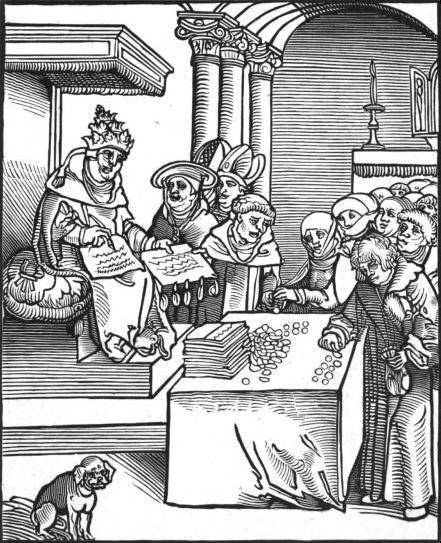"One of the richest sources of ecclesiastical revenue was the sale of indulgences, or the remission by the pope of the temporal penalties of sin, both penance in this life and the pains of purgatory. The practice of giving these pardons first arose as a means of assuring heaven to those warriors who fell fighting the infidel. In 1300 Boniface VIII granted a plenary indulgence to all who made the pilgrimage to the jubilee at Rome, and the golden harvest reaped on this occasion induced his successors to take the same means of imparting spiritual graces to the faithful at frequent intervals. In the fourteenth century the pardons were extended to all who contributed a sum of money to a pious purpose, whether they came to Rome or not, and, as the agents who were sent out to distribute these pardons were also given power to confess and absolve, the papal letters were naturally regarded as no less than tickets of admission to heaven. In the thirteenth century the theologians had discovered that there was at the disposal of the church and her head an abundant 'treasury of the merits of Christ and the saints,' which might be applied vicariously to anyone by the pope. In the fifteenth century the claimed power to free living men from purgatory was extended to the dead, and this soon became one of the most profitable branches of the 'holy trade.'
 |
The Pope as the Antichrist, signing and selling
indulgences, from Luther's 1521 Pasional
Christi und Antichristi,
by Lucas Cranach the Elder (From: Wikipedia) |
The means of obtaining indulgences varied. Sometimes they were granted to those who made a pilgrimage or who would read a pious book. Sometimes they were used to raise money for some public work, a hospital or a bridge. But more and more they became an ordinary means for raising revenue for the curia. How thoroughly commercialized the business of selling grace and remission of the penalties of sin had become is shown by the fact that the agents of the pope were often bankers who organized the sales on purely business lines in return for a percentage of the net receipts plus the indirect profits accruing to those who handle large sums. Of the net receipts the financiers usually got about ten percent; an equal amount was given to the emperor or other civil ruler for permitting the pardoners to enter his territory, commissions were also paid to the local bishop and clergy, and of course the pedlars of the pardons received a proportion of the profits in order to stimulate their zeal. On the average from thirty to forty-five percent of the gross receipts were turned into the Roman treasury." (29-30) --Preserved Smith,
Reformation in Europe

No comments:
Post a Comment